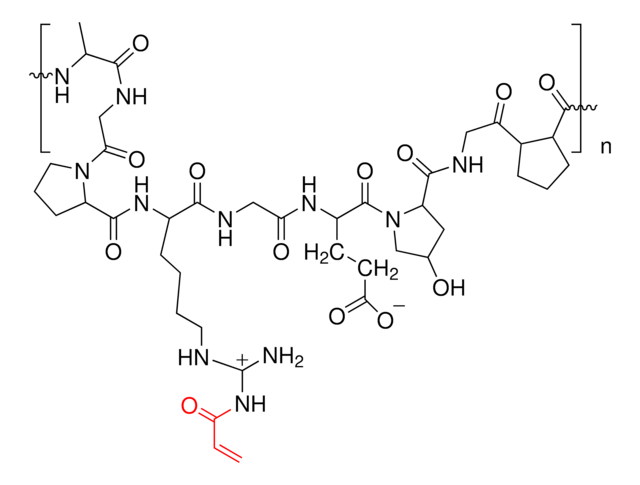900741
Gelatin methacryloyl
gel strength 170-195 g Bloom, degree of substitution: 60%
Synonym(s):
GelMA, Gelatin methacrylamide, Gelatin methacrylate, GelMa, Gelatin Methacrylate
About This Item
Recommended Products
Looking for similar products? Visit Product Comparison Guide
Application
Storage Class Code
11 - Combustible Solids
WGK
WGK 3
Flash Point(F)
Not applicable
Flash Point(C)
Not applicable
Certificates of Analysis (COA)
Search for Certificates of Analysis (COA) by entering the products Lot/Batch Number. Lot and Batch Numbers can be found on a product’s label following the words ‘Lot’ or ‘Batch’.
Already Own This Product?
Find documentation for the products that you have recently purchased in the Document Library.
Customers Also Viewed
Articles
Discussion of synthetic modifications to gelatin, improving the three-dimensional (3D) print resolution, and resulting material properties.
Professor Shrike Zhang (Harvard Medical School, USA) discusses advances in 3D-bioprinted tissue models for in vitro drug testing, reviews bioink selections, and provides application examples of 3D bioprinting in tissue model biofabrication.
Professor Shrike Zhang (Harvard Medical School, USA) discusses advances in 3D-bioprinted tissue models for in vitro drug testing, reviews bioink selections, and provides application examples of 3D bioprinting in tissue model biofabrication.
Protocols
Frequently asked questions (FAQs) for KAPA SYBR® FAST One-Step qRT-PCR Kits.
Frequently asked questions (FAQs) for KAPA SYBR® FAST One-Step qRT-PCR Kits.
Frequently asked questions (FAQs) for KAPA SYBR® FAST One-Step qRT-PCR Kits.
Related Content
Tissue engineering fabricates tissues cultures from scaffolds, living cells, and biologically active molecules by simulating the microenvironment of the body to repair or replace damaged tissue.
Tissue engineering fabricates tissues cultures from scaffolds, living cells, and biologically active molecules by simulating the microenvironment of the body to repair or replace damaged tissue.
Tissue engineering fabricates tissues cultures from scaffolds, living cells, and biologically active molecules by simulating the microenvironment of the body to repair or replace damaged tissue.
Tissue engineering fabricates tissues cultures from scaffolds, living cells, and biologically active molecules by simulating the microenvironment of the body to repair or replace damaged tissue.
Our team of scientists has experience in all areas of research including Life Science, Material Science, Chemical Synthesis, Chromatography, Analytical and many others.
Contact Technical Service










